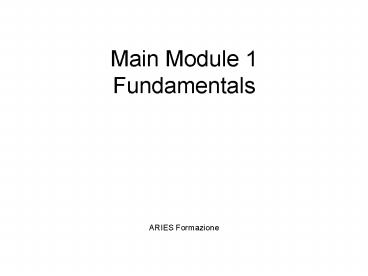Main Module 1 Fundamentals PowerPoint PPT Presentation
1 / 13
Title: Main Module 1 Fundamentals
1
Main Module 1Fundamentals
ARIES Formazione
2
Structure Main Module 1
Main Module 1 Fundamentals
Module 1 Design process
Module 2 Principles of Electrical and Control
Engineering
3
Description of individual courses (lecturing)
- Course title
- Type of course
- Level of course
- Year of study
- Number of the module
- Number of Credits allocated (workload based)
- Objectives of the course (expected learning
outcomes and competences to be acquired) - Prerequisites
- Course contents
- Recommended reading
- Teaching methods
- Assessment methods
- Language of instruction
4
Type and level of course Compulsory Bachelor stage 40 hours 2 lectures / weekly 1 seminar / weekly
Type and level of course Study branch Teaching of vocational courses
Specialization Engineering
Year of course 2nd year
5
Learning outcomes of Module 2
- Introduce students to the epistemic
characteristics of information technology,
generic to information technology and specific to
the fields in which the information technology is
used - Classify and analyze the relationships among the
concepts used in technology education as they
apply to electronics technology - Characterize and describe the principles related
to lifelong learning - Provide a foundation for further study and
employment in a range of contexts where this
knowledge and understanding will be applied.
6
Pre-requisites
- Basic knowledge in electronics
- Knowledge in a simple control system
- Basic knowledge in computer handling
7
Structure Module 2
Module 2 Principles of Electrical and Control
Engineering
Lecture Processing
Lecture Communication
8
Object oriented thematically enclosed list of
subjects (submodules)
- Communications Basics
- Digital transmission of analog signals
- Probability and Random Variables
- Random Processes
- Noise in Analog Communication Systems
- Optimum Detection
- Analog data
- Feedback principles application to Operational
Amplifiers - Digital data
- Digital Logic Elements
- Multivibrators
- Combinational logic circuits
9
Object oriented thematically enclosed list of
subjects (submodules)
- Communications Basics
- Digital transmission of analog signals
- Probability and Random Variables
- Random Processes
- Noise in Analog Communication Systems
- Optimum Detection
- Analog data
- Feedback principles application to Op Amps
- Digital data
- Digital Logic Elements
- Multivibrators
- Combinational logic circuits
Lecture Communication
Compulsory
Elective
10
Object oriented thematically enclosed list of
subjects (submodules)
- Communications Basics
- Digital transmission of analog signals
- Probability and Random Variables
- Random Processes
- Noise in Analog Communication Systems
- Optimum Detection
- Analog data
- Feedback principles application to Op Amps
- Digital data
- Digital Logic Elements
- Multivibrators
- Combinational logic circuits
Lecture Processing
Compulsory
Elective
11
Object oriented thematically enclosed list of
subjects (submodules)
- Communications Basics
- Digital transmission of analog signals
- Probability and Random Variables
- Random Processes
- Noise in Analog Communication Systems
- Optimum Detection
- Analog data
- Feedback principles application to Op Amps
- Digital data
- Digital Logic Elements
- Multivibrators
- Combinational logic circuits
Lecture Communication
Lecture Processing
Compulsory
Elective
12
Teaching methods
Lecture traditional face to face lesson
Seminars Working in groups in order to deepen the compulsory subjects
Homework Processing of the subject
13
Recommended readings
-Geraci, Principi di elettronica dei sistemi
digitali, McGraw-Hill, 2003 -F. Fummi, M.G.
Sami, G. Silvano, Progettazione digitale,
McGraw-Hill, 2002
Assessment criteria
Seminars Homework Final exam 10 20 70

